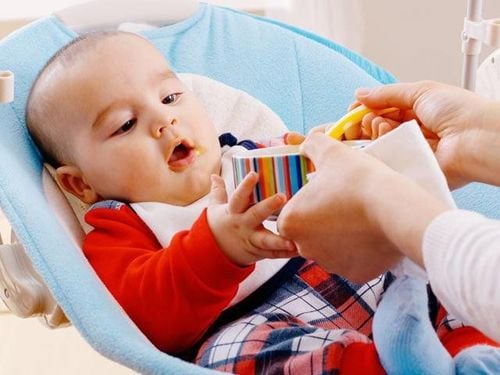This is an automatically translated article.
The article was professionally consulted by Doctor of Pediatrics - Neonatology - Vinmec Nha Trang International General Hospital.During the first months of life, the baby's body is gradually developing more perfect both physically and mentally. This is also the time when babies begin to enjoy exploring the world around them. This has inadvertently increased the risk of injury in the baby, so parents should be especially careful when caring for babies at this age.
1. Development of 2-6 months old baby
During this period, the baby's body is gradually developing more and more perfect. Baby has begun to communicate with people around more with smiles or babbles. In addition, babies at the age of 2-6 months also know how to self-soothe. However, at this time, the baby still needs gentle care and patience from parents.Caring for your baby's physical needs and creating a sense of security is important during this time. You should be ready to care for and comfort your baby whenever they need it, as this will create an increasingly strong bond between you and your baby.
In addition, babies 2-6 months old are also gradually developing in all aspects, including physical, emotional, social and cognitive. Specifically:
Physical:
Keeps head more stable, knows how to turn head in the direction of interest Knows cues when hungry or sleepy Knows to reach and hold toys momentarily Starts tracking moving objects with eyes Hands to mouth at 4 months Elbows up on tummy Emotions:
Crying in different ways to signal your baby's wants Starts to fuss less by 3 and a half months Starts learning to do things on their own Calm yourself Social:
Enjoys listening to talking, singing, or playing with children Smiling at people around them, especially when you smile at them Learning some facial expressions Perceiving (thinking and communicating ):
Knows how to express sad and happy emotions Starts learning from certain sounds that children have heard Discover new things by looking around Knows how to turn their heads in the direction of sounds Starts to recognize people or familiar object in the distance Excitement at the sight of food In general, all areas of a child's development are interconnected, in which the development of one area c can affect all remaining fields. Child development is guided by the brain.
During this stage, connections in the brain continue to form and become stronger through the child's daily experiences. Therefore, parents should spend more time taking care of and playing with their children. When you understand what your baby wants and needs, taking care of them will become lighter and more enjoyable.

Trẻ thường quấy khóc nhiều nhất vào khoảng 2 tháng tuổi và sau đó giảm dần
2. Daily care and injury prevention for babies 2-6 months old
This is a period when children are changing rapidly, so parents need to constantly change their care for their children every day. On the other hand, the risk of injury also increases significantly as children grow and develop.2.1. Taking care of your baby's sleep Normally, babies give off signals when they feel hungry or sleepy. As babies move into 2-6 months of age, they'll soon develop their own sleeping patterns and feeding patterns. You don't have to wake them up to eat, as long as they're healthy, gaining weight, and growing properly.
In fact, a baby's sleep needs include:
every 3-4 hours, sometimes only about every 2 hours Sleeping a total of 14-17 hours a day for the first 3 months, then gradually decreasing to 12 -16 hours for babies 4-12 months Baby's sleep patterns stay the same until they're about 5-6 months old. Some babies may start sleeping longer at night when they are 3 months old. By understanding and responding to your baby's cues or patterns of waking or sleeping, you can help them form good sleep habits early on.
Besides, you should also follow all recommendations for baby's safe sleep until 1 year of age. This will greatly reduce the risk of SIDS and prevent unfortunate sleep-related injuries or deaths in infants.
You should stop swaddling your baby in the following cases:
The baby no longer needs swaddling to deal with or soothe them The baby has learned to turn over Tear the diaper (usually in babies 2-3 months old) 2.2 . Crying babies are usually the most fussy around 2 months of age and then gradually decrease. Between 2-4 months of age, a baby's cry will vary according to their needs.
In some cases, babies are fussy even when comforted. At this point, you need to take a moment to calm down, then continue to try to calm the child.

Trẻ thường quấy khóc nhiều nhất vào khoảng 2 tháng tuổi và sau đó giảm dần
It is important that you pay attention to cleaning your baby's gums on a regular basis, even before they start teething. You can clean your baby's gums with a clean soft cloth in the morning and at night. Until teeth have come in, brush your baby's teeth twice a day, especially at bedtime. You should choose a small, soft-bristled toothbrush and natural toothpaste to prevent tooth decay for young children.
In addition, you should not give your baby any oral support products that are not prescribed by a specialist.
2.4. Routine health check-ups for babies During the first 6 months after birth, babies should be taken for regular health check-ups to monitor and support their growth and development.
You need to monitor your child's health more closely to detect early signs of illness, such as fever, vomiting, diarrhea, dehydration, rash, cough and ear infections. If a baby under 3 months of age has a temperature below 36.5°C (97.8°F) or higher than 37.5°C (99.5°F), get him or her to a medical facility early to get checked out. timely diagnosis and treatment.

Trong 6 tháng đầu tiên sau khi sinh, trẻ nên được đưa đi thăm khám sức khỏe định kỳ
Falling Burns Sleeping safety Water safety Choking and poisoning Toy seats When a child has abnormal signs of health, parents can take the child to Vinmec Health system for timely examination and treatment.
As a key area of Vinmec Health System, Pediatrics Department - Vinmec Times City International Hospital always brings satisfaction to customers and is highly appreciated by industry experts thanks to the following advantages:
Gathering a team of leading doctors and nurses in Pediatrics: including leading experts, highly qualified (professor, associate professor, doctorate, master), experienced, worked in big hospitals like Bach Mai, 108.. The doctors are all well-trained, professional, have a heart - reach, understand young psychology. In addition to domestic pediatric specialists, the Department of Pediatrics also has the participation of foreign experts (Japan, Singapore, Australia, USA) who are always pioneers in applying the latest and most effective treatment regimens. . Comprehensive services: In the field of Pediatrics, Vinmec provides a series of continuous medical examination and treatment services from Newborn to Pediatric and Vaccine,... according to international standards to help parents take care of their baby's health from birth to childhood. from birth to adulthood Specialized techniques: Vinmec has successfully deployed many specialized techniques to make the treatment of difficult diseases in Pediatrics more effective: neurosurgery - skull surgery, stem cell transplantation. blood in cancer treatment. Professional care: In addition to understanding children's psychology, Vinmec also pays special attention to the children's play space, helping them to have fun and get used to the hospital's environment, cooperate in treatment, improve the efficiency of medical treatment.
Please dial HOTLINE for more information or register for an appointment HERE. Download MyVinmec app to make appointments faster and to manage your bookings easily.
Reference source: healthyparentshealthychildren.ca












